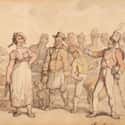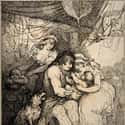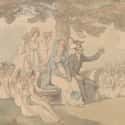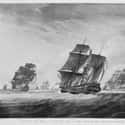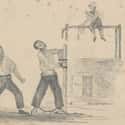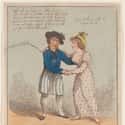-
(#7) Some Of The Women Might Have Been Sex Workers In England
Though they were not being transported to New South Wales for prostitution, many of the women aboard the Lady Juliana may have been ladies of the night. A robust harlotry economy existed in 18th-century Britain, so it's reasonable to assume that some of the 200-plus convicts took part.
Moreover, many of the passengers' stories fell into the "fallen woman" trope that had become popular in novels and plays. John Nicol believed many of the women had been seduced at some point in their lives. He wrote about how Sarah Dorset, for example, had "fallen" into a life of alleged folly and sin:
She had not been protected by the villain that ruined her above six weeks; then she was forced by want upon the streets, and taken up as a disorderly girl; then sent onboard to be transported.
-
(#13) Some Of The Women Brought Their Children, And Others Gave Birth On The Way
Some of the women aboard the Lady Juliana were already mothers before the ship departed England, and so they brought their children with them. Many of the convict-passengers became pregnant and even gave birth during the long voyage.
Historians generally believe five to seven babies were born on the ship, but steward John Nicol suggested no less than 20 had been born while the ship was in port at Rio. They were prepared for the births - the ship had received a small donation of baby linens before leaving England.
-
(#9) About 1 In 5 Of The Passengers Was A Teenager
The vast majority of the women who embarked on the Lady Juliana were in their 20s and 30s. But no fewer than 51 of them - or around 22% - were teenagers. Mary Wade was one of these. Though scholars debate her exact age - recent research says she was 13, while earlier records show she was only 11 - she was the youngest convict on the ship.
Like many of her shipmates, Wade ultimately married and had a large number of children in Australia.
-
(#11) Many Colonists Were Annoyed When The Ship Arrived Carrying Women Instead Of Provisions
The First Fleet of convict-colonists arrived in 1788. So by the time the Lady Juliana sailed into Sydney in June 1790, the people already there were desperate to replenish their severely dwindled supplies. Many of them were disappointed to learn the Lady Juliana was a ship carrying people, not goods. One government official grumbled that the Lady Juliana carried "a cargo so unnecessary and so unprofitable as 222 females, instead of a cargo of provisions."
Though the ship didn't bring much in the way of food and goods, it did bring long-awaited news from home, such as dispatches that first alerted the colonists in Australia to the French Revolution that had erupted in 1789.
-
(#8) The Lady Juliana Provided Better Living Conditions Than Other Convict Ships And British Prisons
The women aboard the Lady Juliana came from British prisons. Though a prison reform movement began to grow in the late 18th century, the prison conditions they escaped were deplorable. Prisons were overcrowded, and diseases spread swiftly.
It was still a prison ship, and most of the passenger-convicts slept just above the ship's garbage and sewage deck. But the women of the Lady Juliana had something that their land-imprisoned counterparts didn't: consistent access to medical care. The ship had a surgeon and was kept relatively clean.
Also, the women weren't chained up like prisoners on other convict ships, and they could barter for improved conditions through various favors. John Nicol credited the ship's captain with being "a humane man" who "did all in his power to make the convicts as comfortable as their circumstances would allow."
Part of the reason the passengers on the Lady Juliana enjoyed better conditions was because the British government oversaw it, unlike the other ships in the Second Fleet. All the other vessels were operated by Camden, Calvert, and King, a notorious and prolific slave trading company. Only five women perished aboard the Lady Juliana, compared to the 267 deaths reported by the other ships.
-
(#6) Elizabeth Barnsley Became An Enterprising Madam Aboard The Ship
One of the most notable convicts on the ship was Elizabeth Barnsley. Her offense: stealing some cloth. She quickly became a leader during the voyage. As John Nicol, steward of the Lady Juliana, recalled, "She was very kind to her fellow convicts, who were poor. They were all anxious to serve her. She was as a queen among them."
Barnsley made the most of her circumstances and turned her position into profits - she was instrumental in overseeing her fellow convicts' economic activities at every port along the way.
New Random Displays Display All By Ranking
About This Tool
In 1787, Britain began to colonize Australia. The British government licensed the lady Juliana to transport nearly 300 prisoners to Australia. Most of the prisoners on this ship were London prostitutes, and some ordinary criminals, such as thieves and shoplifters. The prisoner ship "Lady Juliana" arrived in Sydney in the winter of 1790. It was one of the slowest prisoner ships in history.
The unbelievable thing is that most of the women were pregnant when they landed, because almost every man on this ship had sex with female prisoners, and many had already given birth to children at sea. The lady Juliana was also famous for the "mobile brothel". The random tool brings us to know 14 wild stories of the lady Juliana.
Our data comes from Ranker, If you want to participate in the ranking of items displayed on this page, please click here.











